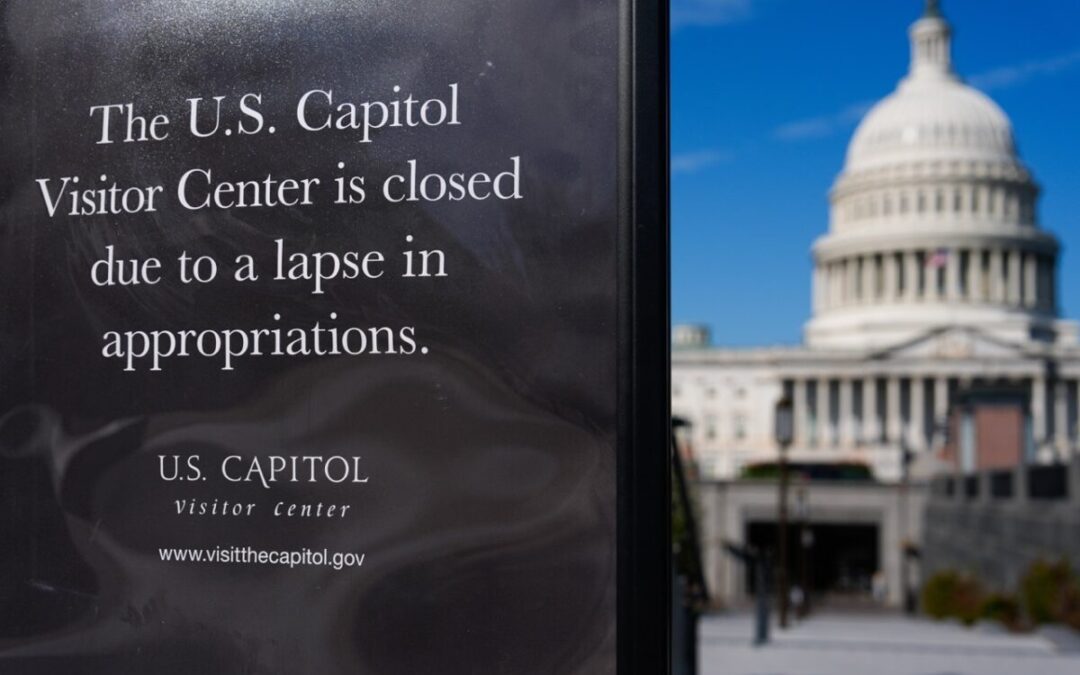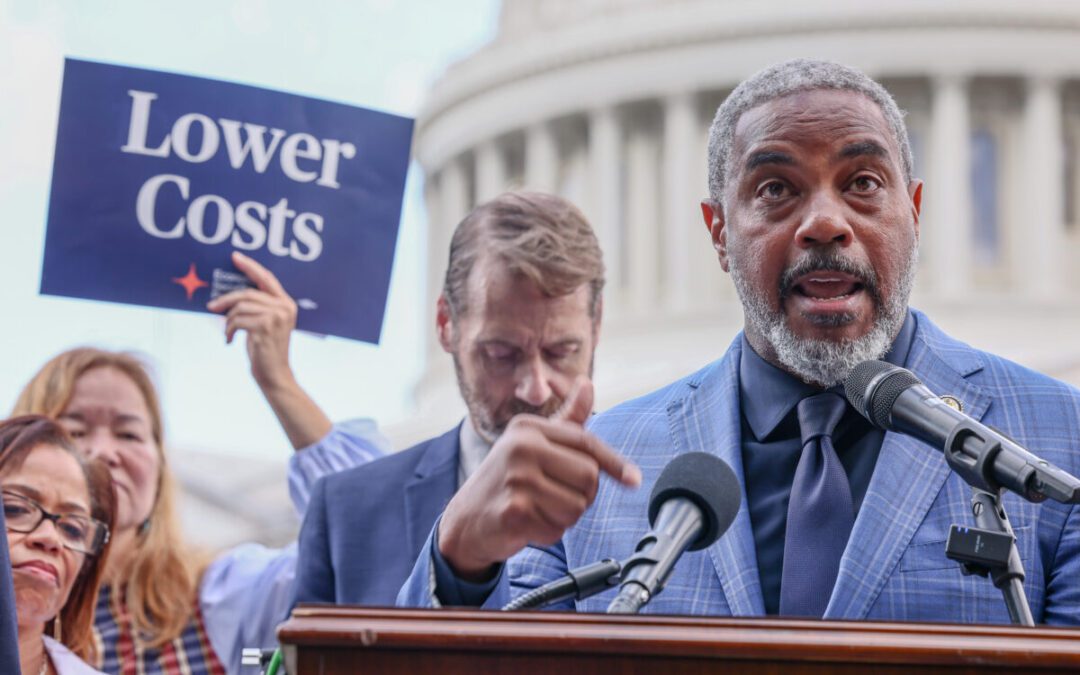
FILE - Rep. Mike Johnson, R-La., speaks after he was chosen as the Republicans latest nominee for House speaker at a Republican caucus meeting at the Capitol in Washington, Tuesday, Oct. 24, 2023. (AP Photo/Jose Luis Magana, File)
Stop us if you’ve heard this one before: The United States government is headed for a shutdown this week due to the failure of Republicans in the House of Representatives to agree on a new federal budget amongst themselves, let alone with Senate Democrats and Republicans and the White House.
A shutdown just before the Thanksgiving holiday could cause chaos at airports, as Transportation Security Administration (TSA) employees and federal air traffic controllers would be forced to work without pay at a time when nearly 5 million people are expected to fly over the five-day period surrounding Thanksgiving, according to estimates from AAA.
Millions of other federal workers would also go without paychecks in such a shutdown, which could also have significant consequences for public safety, disaster preparedness and response, food and safety inspections, and the economy.
How We Got Here
Every year, Congress must pass and the president must sign 12 annual funding bills providing money for different federal agencies and programs. Sometimes these bills are bundled together into one piece of legislation, known as an “omnibus.”
Republicans spent the summer and early fall trying and repeatedly failing to agree on the budget bills, forcing former House Speaker Kevin McCarthy to agree to a 45-day “continuing resolution,” that kept funding levels flat to give lawmakers more time to negotiate.
But that decision cost McCarthy his job, as a group of far-right Republicans voted to remove him from the speaker’s role. This led to a three-week period where the House was paralyzed, as Republicans couldn’t agree on who should lead their caucus.
Ultimately, they landed on Louisiana Congressman Mike Johnson, an extreme, anti-abortion, anti-LGBTQ conservative who was the leading architect of the effort to overturn Donald Trump’s 2020 presidential election loss in Congress.
RELATED: Who is Mike Johnson, the new Speaker of the House?
Since then, Johnson has run into the same problems McCarthy did: trying to pass a budget that includes extreme enough spending cuts and/or anti-abortion and anti-LGBTQ provisions to satisfy the far-right Freedom Caucus, while also not alienating the handful of swing district Republicans that gave the party its narrow majority in the House.
The GOP’s continuing dysfunction has left the government careening towards a shutdown that would begin at 12:01 a.m. on Saturday.
Over the weekend, Johnson introduced another short-term continuing resolution to try and avoid a shutdown. But several far-right conservatives have already declared they will vote against the plan, leaving its status up in the air.
What a Government Shutdown Would Mean for You
If you’re flying soon, you could be in for delays and chaos at airports, where more than 50,000 TSA officers and 13,000 Federal Aviation Administration air traffic controllers would have to work without pay until the government is funded. During the last shutdown in 2019, large numbers of TSA workers called in sick weeks into the shutdown.
Federal housing loans and loans to small businesses could be temporarily halted in a shutdown.
Environmental and food inspections could be limited or delayed, increasing the risk to the food supply, drinking water, and chemical facilities.
If a natural disaster occurs during the shutdown, FEMA’s ability to respond could be impacted.
Tens of thousands of children could lose access to federally-funded childcare slots.
If you want to visit a National Park, you likely won’t be able to.
If you’re one of the millions of federal workers, you’ll be sent home and won’t get paid. If you’re an essential government worker, like a law enforcement officer, active duty military personnel, air traffic controller, or TSA employee, you’ll still work, but you might not get paid until after the shutdown ends.
If you’re one of the tens of millions of Americans who rely on food aid from the Supplemental Nutrition Assistance Program (SNAP), you might not get those benefits.
And if a shutdown drags on for weeks or months, it could have an economic impact, with missed paychecks leading to lower consumer spending. The last shutdown that began in late 2018 and ran into early 2019 cost the US economy $11 billion, according to the nonpartisan Congressional Budget Office.
These Services Will Remain Functional
Social Security recipients will keep getting their payments, because they aren’t funded through the annual budget process. Medicare and Medicaid coverage will also continue without interruption.
VA medical facilities and clinics would also remain operational, but VA call centers and hotlines would not. A shutdown could also create a backlog of veterans’ disability claims.
The United States Postal Service will also continue service.
The White House’s Stance
President Biden has been clear where he stands on the budget: he wants to make a bipartisan deal, but opposes the House Republicans’ various proposals and the threats of a shutdown.
“An Extreme Republican Shutdown would put critical national security and domestic priorities at risk, including by forcing service members to work without pay,” White House Press Secretary Karine Jean-Pierre said in a statement over the weekend. “House Republicans need to stop wasting time on their own political divisions, do their jobs, and work in a bipartisan way to prevent a shutdown.”
What Happens Next?
Johnson hopes to pass his budget bills on Tuesday, and to do so, he’ll almost certainly need Democratic support. If they pass, the government would be funded at current levels for some agencies until Jan. 19, while others would be funded until Feb. 2.

Senator Catherine Cortez Masto leads effort recognizing Hispanic Heritage Month
The Senate passed a bipartisan resolution celebrating Latino cultural and economic contributions, uplifting the 68 million Hispanics in the US, who...

4 claves para entender qué significa el cierre del gobierno y sus consecuencias
Si sólo tienes unos segundos, lee estas líneas: El Congreso de los Estados Unidos no aprobó una ley de financiamiento a corto plazo (conocida como...

‘Sick to my stomach’: Trump distorts facts on autism, tylenol, and vaccines, scientists say
By Amy Maxmen Originally published September 22, 2025 Ann Bauer, a researcher who studies Tylenol and autism, felt queasy with anxiety in the weeks...

What would a government shutdown mean for Nevada?
As a federal shutdown looms, Congressional Democrats hold out for a better deal for their constituents. The federal government could soon shut down...

Conservative activist Charlie Kirk dies after being shot at Utah college event
OREM, Utah (AP) — Charlie Kirk, a conservative activist and close ally of President Donald Trump, was shot and killed Wednesday at a Utah college...

The broken American Dream shines a light on a new path to Mexico
The late ’60s revolutionized the United States—and my dad. In the wake of the assassinations of Martin Luther King Jr. and Robert F. Kennedy, and...




